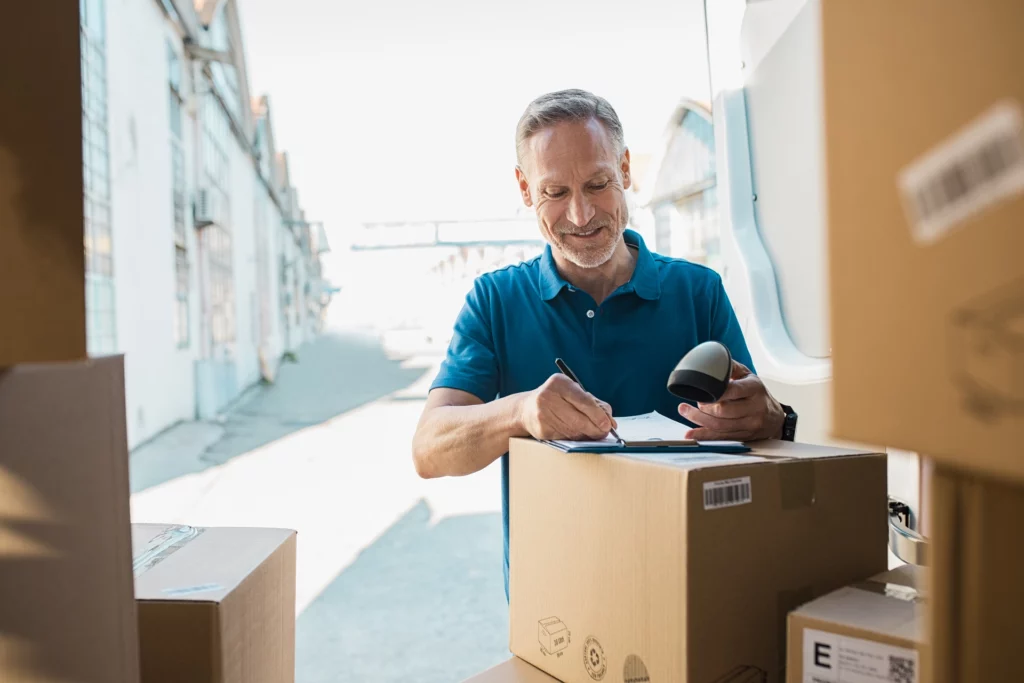26 Supply Chain Experts, Delivery Professionals & eCommerce Retailers Reveal the Most Overlooked Aspects of Compliance, Certifications, or Scoring in the Last Mile

Wise Systems

The last mile is the final leg in the supply chain—the last step in a product’s journey to its final destination. It also accounts for a substantial portion of total delivery costs. The last mile is crucial for operational efficiency, customer satisfaction, and ultimately, the bottom line.
However, several aspects of compliance, certifications, and scoring in the last mile are commonly overlooked by last-mile operators, potentially leading to inefficiencies and legal pitfalls.
In this article:
- Why Do Compliance, Certifications, and Scoring Matter in the Last Mile?
- Meet Our Panel of Supply Chain Experts, Delivery Professionals & eCommerce Retailer
- The Most Overlooked Aspects of Compliance, Certifications, or Scoring in the Last Mile
- Frequently Asked Questions
Why Do Compliance, Certifications, and Scoring Matter in the Last Mile?

Compliance with local, national, and international regulations is fundamental in last-mile logistics. This includes adherence to transportation laws, environmental regulations, and safety standards such as the Federal Motor Vehicle Safety Standards (FMVSS). Non-compliance can lead to legal penalties, fines, and operational disruptions.
Compliance and certifications often encourage companies to adopt best practices in logistics and delivery operations. This leads to more efficient, safe, and reliable delivery processes.
Scoring systems, like CSA (Compilance, Safety, and ACcountability) scores, provide a quantifiable measure of a company’s performance in various areas, including safety, efficiency, and reliability. These scores help businesses identify areas for improvement and benchmark their performance against industry standards and competitors.
To gain some insight into the most overlooked aspects of compliance, certifications, and scoring in the last mile, we reached out to a panel of supply chain experts, delivery professionals, and eCommerce retailers and asked them to answer this question:
“What’s the most overlooked aspect of compliance, certifications, or scoring in the last mile?”
Meet Our Panel of Supply Chain Experts, Delivery Professionals & eCommerce Retailers:
The Most Overlooked Aspects of Compliance, Certifications, or Scoring in the Last Mile
Keep reading to learn what our panel had to say about the critical aspects of compliance, certifications, and scoring you might be overlooking in the last mile—and what you should be focusing on.
 Matt Dehdar
Matt Dehdar
Matt Dehdar is the Maintenance Manager at Regency Fire. As a professional Maintenance & Engineering Project Manager, Matt brings a wealth of experience in managing maintenance and technical aspects of Fireplace installation.
“From start to finish, a company should always follow compliance laws, but in the last mile…”
If a company has the chance to hone in on and enhance compliance, then they should take advantage of that,
Sustainability is at the forefront of most eCommerce companies’ minds, and with governments and state jurisdictions cracking down on sustainability practices, it’s more important than ever to take into consideration the sustainability of a company’s delivery system. Not to mention the social and moral responsibility that companies should hold when thinking about sustainability, making adjustments and improvements wherever they can for the betterment of the planet.
As a manufacturer, we make it a point to follow emission caps, and these caps also pertain to our delivery vehicles. Since you can’t really deliver a fireplace and/or materials at a parcel locker, and you can’t deliver a fireplace on a bike, we’ve made the investment to use green vehicles so as to reduce our emissions by around 23% per delivery.
The investment we had to make was a large one, but it has made our shareholders happy, our customers happy, and we remain in full compliance with sustainability standards.
 Mushfiq Sarker
Mushfiq Sarker
Mushfiq is the founder of Web Operators, a business that helps entrepreneurs manage their online business.
“A critical blind spot in last-mile logistics? Many overlook the…”
Nuanced local regulations and requirements. In various regions, there’s a patchwork of rules for vehicle types, delivery windows, or emissions standards.
Additionally, the emphasis on speed often overshadows the growing expectation of environmentally conscious delivery options. Certifications like ISO or other standards can offer broad guidelines, but they may not always align with regional needs.
Meanwhile, e-retailers frequently underestimate the importance of transparent communication regarding delivery constraints and potential delays. eCommerce is global, but the last mile is intensely local. To succeed, blend global strategies with a local lens. Be adaptable and keep customers in the loop. That’s the key.
 Tyler Browne
Tyler Browne
Tyler is the enthusiastic founder of To the Cloud, your go-to online shop for new and certified used vaporizers and accessories. He’s deeply ingrained in the dynamic worlds of the cannabis industry, eCommerce, and consumer electronics.
“Navigating the complexities of last-mile delivery is indeed a challenge for any eCommerce business…”
One of the most overlooked aspects of compliance, in my experience, is the management of customer data privacy during this particular phase. Last-mile involves direct interaction with the customers and, hence, makes the handling of their data both crucial and sensitive.
For example, GPS tracking often used in last-mile delivery presents a significant risk if mishandled. Another overlooked element is the environmental impact of last-mile practices – reducing carbon footprint and noise pollution is not just about regulatory compliance, but progressively becoming a criterion customers hold businesses accountable to.
Last, the adhesion to labor laws pertaining to delivery personnel often gets sidelined amidst quicker delivery objectives.
These aspects not only pertain to regulatory compliance but also fundamentally speak to promoting responsible business operations and establishing consumer trust. Truly efficient operations in the last mile encompass a lot more than just swift logistics.
 Albert Vaisman
Albert Vaisman
Albert Vaisman is the founder of Soxy. Soxy is a new generational media company that connects content & commerce in a seamless way.
“Logistics and supply chains are some of the most heavily regulated industries in the world, and this will get worse as we rely more on technology and AI…”
The key to success is not to run from certification, or only get the ones necessary for your company to run. I’d suggest embracing the concept and making your company comply with as many regulatory directives as possible.
For example, SOX is a compulsory book-keeping certification from the government, so you have no choice in the matter. On the other hand, SOC is a voluntary audit for internal efficiency. Getting the SOC is going to give you more trust in your employees, and it’s going to make your shareholders trust you more as well.
If you go ahead and get SOC 2 as well, which checks the security of your customer’s data, it’s even better. As consumers get more educated, they will appreciate you safeguarding their resources as a courier.
 Saj Munir
Saj Munir
Saj is an entrepreneur and the founder of Chorlton Fireworks with over 20 years of experience as an eCommerce and brick-and-mortar business owner.
“In my extensive experience as an entrepreneur running Chorlton Fireworks, one crucial aspect often overlooked in the last-mile delivery process is…”
Understanding local regulations and permits. Navigating the intricate web of rules and permits specific to different areas can be challenging. It’s not merely about having a fantastic product and a seamless delivery system; it’s about ensuring that every step complies with local laws and regulations.
From the types of products that can be delivered to specific delivery hours, each area might have unique requirements. Overlooking these local nuances could lead to legal issues, fines, or even the suspension of delivery operations in certain areas, which can significantly impact the business’s reputation and bottom line.
Another aspect that often goes unnoticed in the last-mile delivery process is the environmental impact and sustainability of the delivery operations. With the growing concern for climate change and environmental conservation, customers are becoming increasingly conscious of the ecological footprint of their purchases.
Businesses, including mine, need to focus on eco-friendly packaging, energy-efficient delivery routes, and options like electric vehicles. Moreover, adhering to certifications like carbon-neutral delivery or Green Logistics not only demonstrates our commitment to the environment but also attracts a segment of environmentally conscious consumers.
Overlooking these sustainability factors not only harms the planet but can also lead to a loss of customer trust and loyalty.
In the digital age, where data breaches and privacy concerns make daily headlines, safeguarding customer data is paramount. Often, in the rush to provide seamless last-mile delivery services, businesses might overlook the importance of data security and customer privacy.
Compliance with data protection laws such as GDPR (General Data Protection Regulation) is not only a legal requirement but also a fundamental aspect of building trust with customers. Overlooking robust data security measures can result in data breaches, eroding customer confidence and potentially leading to legal consequences and financial losses.
As an entrepreneur, I’ve realized the significance of investing in secure data management systems and regularly updating protocols to ensure the highest level of customer data protection.
In the pursuit of efficiency and cost-effectiveness, the welfare of the workforce involved in the last-mile delivery process can sometimes be overlooked. Ethical labor practices, fair wages, and ensuring the well-being of delivery personnel are integral to a sustainable and responsible business model.
Overlooking these aspects can lead to high employee turnover, reduced morale, and even legal issues related to labor practices. Recognizing and valuing the efforts of the workforce, providing proper training, and ensuring fair compensation are not only ethical imperatives but also crucial for maintaining a motivated and efficient team.
Prioritizing the welfare of the workforce contributes significantly to the overall success and reputation of the business.
While last-mile delivery is undeniably a vital component of the eCommerce landscape, understanding and addressing these often overlooked aspects of compliance, certifications, and scoring are essential for the sustained growth and success of any business, including Chorlton Fireworks. By focusing on local regulations, environmental sustainability, data security, and ethical labor practices, we can build a delivery system that not only meets legal requirements but also earns the trust and loyalty of our customers, fostering long-term relationships and ensuring the enduring prosperity of the business.
 Elisa Bender
Elisa Bender
Elisa Bender is the co-founder of RevenueGeeks.
“In the past few years, regulations have been made to adopt sustainable practices for last-mile delivery…”
However, businesses have failed to incorporate this into their supply chain operations. It is of great importance to consider adopting sustainable practices in logistics to enhance operational excellence.
Last-mile delivery must be compliant with practices that could impact the environment positively. Not many companies are using green services; it is advised to add green solutions to deliver more environmentally friendly deliveries.
 Jordan Adair
Jordan Adair
Jordan is the CEO and owner of ShirtMax, an eCommerce wholesale clothing company operating since 2014.
“One of the most commonly overlooked aspects of compliance, certifications, and scoring in the last-mile delivery process is…”
The environmental sustainability factor. Customers increasingly value environmentally friendly practices. Therefore, integrating green certifications and sustainable strategies into your last-mile operations can provide a competitive edge while reducing your carbon footprint.
This often includes selecting eco-friendly packaging materials, optimizing delivery routes for fuel efficiency, and monitoring emissions. Neglecting this aspect misses an opportunity to align with consumer values and risks falling behind in an evolving business landscape where sustainability matters more than ever.
 Andrei Vasilescu
Andrei Vasilescu
Andrei Vasilescu is the Co-Founder & CEO of DontPayFull, and he brings extensive expertise in finance, economics, business, and marketing to the table.
“In my experience, one aspect of compliance, certifications, or scoring that often gets overlooked in the last mile is…”
The importance of communication. Effective and transparent communication plays a vital role in ensuring compliance requirements are met, certifications are maintained, and scores are achieved.
It is not only essential to clearly communicate compliance expectations and guidelines to all stakeholders involved, but also to provide regular updates and feedback throughout the process. This fosters a culture of accountability and encourages proactive problem-solving.
Furthermore, clear communication enables organizations to address any potential issues or gaps promptly, preventing them from becoming larger compliance concerns. By prioritizing communication, companies can enhance their compliance efforts, maintain certifications, and improve their scores in the last-mile delivery of compliance initiatives. Remember, good communication is the key to successful compliance management.
 Eric Sornoso
Eric Sornoso
Eric Sornoso is the CEO of Mealfan.
“The last-mile delivery sector is rapidly evolving, driven by increasing consumer demands and technological advancements…”
While there are several crucial aspects of compliance, certifications, and scoring in this field, one often overlooked is environmental and sustainability standards management.
In recent years, environmental concerns have taken center stage globally. Consumers increasingly make choices based on a company’s environmental responsibility, creating a competitive advantage and a potential pitfall for last-mile delivery providers. Here are some key points to consider:
- Emissions Reduction: The transportation sector significantly contributes to greenhouse gas emissions. Overlooking sustainability practices can result in reputational damage and potential regulatory issues. Last-mile providers must adopt eco-friendly practices, such as using electric or hybrid vehicles and route optimization to reduce emissions.
- Packaging and Waste Management: Sustainable packaging is becoming a consumer expectation. Overlooking environmentally responsible packaging practices can result in excess waste, which, in turn, affects a company’s eco-friendly image. Reducing waste through efficient packaging and recycling initiatives is crucial.
- Certifications and Auditing: Many companies overlook the importance of obtaining recognized certifications related to sustainability, such as ISO 14001 for environmental management. Third-party auditing can help assess and improve compliance with these standards.
- Sustainability Scoring: Some industries are introducing scoring systems that assess a company’s environmental footprint. Neglecting efforts to improve this score can lead to lost business opportunities and the potential for financial penalties.
 Scott Trachtenberg
Scott Trachtenberg
Scott Trachtenberg is the CEO of ADA Site Compliance, a leading provider of ADA compliance solutions for businesses of all sizes.
“One of the most overlooked aspects of compliance, certifications, or scoring in the last mile is…”
Local regulations and permits. It is easy to ignore the necessity of complying with local regulations and obtaining permits for certain delivery locations, which can result in fines and delays.
The regulatory climate in the regions in which a company operates must be thoroughly understood by that company, and the company must ensure that it complies with all applicable regulations.
 Jason Wise
Jason Wise
As the Editor at EarthWeb, Jason has written extensively about AI, security, privacy, social media, and how these interact with finance and business.
“One thing often underestimated in last-mile delivery is…”
The importance of environmental certifications. It’s not just about getting the package to the door; it’s also about doing it sustainably.
Many customers are becoming more environmentally conscious, and having certifications like carbon-neutral or eco-friendly packaging can be a competitive advantage.
Moreover, the significance of local regulations is frequently overlooked. Each locality may have its own set of rules and restrictions, which can affect delivery operations. Being compliant on a local level can prevent legal issues and enhance customer satisfaction.
Lastly, the impact of data security and privacy compliance in the last-mile can’t be ignored. With the increasing use of technology in logistics, ensuring customer data is protected is vital. Failing to do so can result in reputational damage and legal consequences.
 Alex Mastin
Alex Mastin
Alex Mastin’s world consists of coffee, business, travel, and dogs…sometimes all at the same time! He spent years as a traveling barista where he learned the art of brewing coffee on the road, which helped inspire his business. Alex is the CEO and Founder of Home Grounds.
“As part of my job, I work closely with coffee suppliers and eCommerce retailers, helping them find sustainable solutions, improve their processes, and increase their reach…”
Supply-chain logistics play a big part in this.
I think one of the most overlooked factors in the last-mile delivery process is communication. You absolutely have to get this right. You need to communicate with your teams on the ground, so you know exactly where things are at, so you can estimate timeframes, anticipate and avoid obstacles, and adapt to issues like traffic or weather conditions.
You also need to relay information to the customer. One of the biggest irritations for consumers is having to wait for deliveries which are late or rescheduled at the last minute.
Keeping in contact means they will be fully informed at every step of the way and can factor this into how they plan their day. You don’t want to go overboard with communications though, as this too is annoying. Rather, keep it relevant, and if possible, update in real time so the data they receive is as accurate as possible.
Communication really is the key to increasing efficiency, engagement, and customer satisfaction.
 Tara Milburn
Tara Milburn
Tara Milburn is the Founder, President/CEO of Ethical Swag Inc. (Certified B Corporation), a company that takes the guesswork out of sourcing sustainable promotional products. She came to entrepreneurship in her 50s, determined to create a different kind of business–one in which profit, planet, and people coexist.
“While the primary focus of last-mile delivery was once speed and efficiency, a crosswinds of consumer expectations, regulatory changes, and shared commitment to better ESG outcomes has shifted that focus…”
A compliant, certified, and holistic approach to that kind of final-mile delivery requires changes in a few different areas.
The first is environmental compliance. With the increasing focus on sustainability and reducing carbon footprints, there’s a growing need to ensure that last-mile delivery is environmentally friendly. This includes using electric or hybrid vehicles, optimizing routes to reduce fuel consumption, and using sustainable packaging.
The second is data privacy. Ensuring that delivery personnel are trained in safety protocols, both for their own safety and the safety of the recipients, is crucial. This includes training on handling hazardous materials, understanding traffic rules, and ensuring vehicle safety.
Finally, accessibility is multifaceted in last-mile operations. Accessibility ensures all customers, including those with disabilities, can receive their deliveries without barriers is often not given enough attention. This includes considering things like package size, delivery location, and communication methods.
While many companies might have scoring or rating systems for their delivery process, they might not have a robust mechanism for collecting feedback from customers or addressing grievances that works for everyone.
Extending a focused accessibility across training protocols—making sure that delivery personnel are adequately trained and, if necessary, certified for their roles—is crucial. This might include training in customer service, handling specific types of goods, or understanding the technology used in the delivery process.
Making the entire last-mile delivery process is ethical, from fair wages for delivery personnel to ethical sourcing of packaging materials, doesn’t happen overnight, and it’s a function that was previously overlooked in the rush to optimize for speed and cost. Luckily, regulatory pressures and changing customer and corporate aims are making these kinds of changes the top priority.
It’s important for final-mile providers to work slowly and in partnership toward the kinds of changes they’re looking to make.
 Alexander Havkin
Alexander Havkin
Alex is a seasoned Regional Sales and Project Manager at Ecoline Windows. With over seven years of experience in the industry, he has successfully managed thousands of projects, ensuring the highest quality of window replacement services for his clients.
“In the intricate realm of last-mile delivery, the significance of environmental accountability and sustainability certifications often goes unnoticed…”
Companies predominantly focus on swift and efficient delivery, sometimes at the expense of their environmental responsibilities. For instance, they might opt for quicker routes and older vehicles, resulting in greater environmental impact.
Additionally, the high volume of packages, particularly during peak seasons, leads to increased packaging waste. Despite the availability of greener options, which may incur higher costs or be lesser-known, the pressure to maintain competitive pricing and expedited delivery frequently outweighs the consideration for eco-friendly alternatives.
Neglecting environmental standards in last-mile delivery can culminate in a plethora of legal challenges and missed opportunities to cultivate a robust, trustworthy brand. It is imperative for businesses to embrace sustainable practices and pursue certifications that underscore their dedication to a sustainable future.
At Ecoline Windows, we are proactively addressing these issues, acknowledging the long-term advantages of environmental stewardship in last-mile delivery. By investing in eco-friendly vehicles, refining delivery routes, and utilizing sustainable packaging, we strive to balance efficiency with environmental responsibility.
 Alex Williams
Alex Williams
Alex Williams is the CFO of FindThisBest, a comprehensive guide for shopping retail products.
“Companies overlook eco-friendly practices in last-mile compliance…”
Businesses often neglect environmental impact. They focus on efficiency and speed.
Consumers value companies committed to sustainability. So, they can’t ignore these practices. Otherwise, they’ll have a negative image. It will cost their business to lose opportunities.
Companies should welcome environmental measures. These include electric or hybrid delivery vehicles. This attracts a growing segment of eco-minded consumers.
 Michael Wall
Michael Wall
Michael is the founder of Codefixer, the software development and growth agency.
“One often overlooked aspect of last-mile compliance is…”
Sustainability. As eCommerce and last-mile delivery explode, environmental concerns tend to take a backseat. Companies focus on speed and cost-effectiveness, but they should also prioritize eco-friendly practices.
Reducing emissions, using electric or low-emission vehicles, and optimizing routes to minimize fuel consumption are crucial. Compliance and scoring systems should incorporate sustainability metrics.
It’s not just about getting packages to the doorstep; it’s about doing so while minimizing the carbon footprint. Consumers increasingly value sustainability, and businesses that embrace it can gain a competitive edge in the last-mile race.
So, think green when considering compliance and certifications in the last mile—it’s a dimension that’s often missed but increasingly important for both the planet and your business’s reputation.
 Cort Adair
Cort Adair
Cort Adair is the CEO and founder of The Adair Group.
“The human element is often the most overlooked aspect of compliance and scoring in last-mile delivery…”
While technology and automation play crucial roles, delivery personnel’s performance and adherence to safety protocols are paramount.
Many eCommerce retailers focus on optimizing routes and tracking, which are essential. Still, they sometimes neglect the importance of ensuring drivers are well-trained, follow ethical practices, and maintain a strong customer-centric approach.
A simple smile and polite interaction during the final handoff can significantly impact customer satisfaction, repeat business, and brand reputation. So, investing in employee training, behavior monitoring, and continuous feedback mechanisms can be a game-changer in the last mile.
 David Cohen
David Cohen
David Cohen is the CEO of Love Rose. We’re one of the UK’s largest online flower delivery services, with several central London shops open 24/7.
“One of the most overlooked aspects of compliance, certifications, or scoring in last-mile delivery, as observed in the eCommerce industry, is…”
The integration of sustainability and environmental considerations. In the current era, where environmental consciousness is at the forefront, ensuring that last-mile logistics align with eco-friendly practices is paramount.
Many businesses focus primarily on meeting delivery schedules and cost-effectiveness, often neglecting the impact on the environment. To address this, Love Rose has actively integrated sustainable practices into our last-mile strategy. We collaborate with logistics partners who prioritize eco-friendly vehicles, optimize routes to reduce emissions, and implement packaging solutions that minimize waste.
Moreover, obtaining certifications such as carbon-neutral shipping or eco-friendly packaging can set eCommerce retailers apart and demonstrate a commitment to sustainability. This approach not only contributes to reducing the carbon footprint but also resonates positively with environmentally conscious consumers, aligning compliance with the values of the modern market.
 Robert Khachatryan
Robert Khachatryan
Robert Khachatryan is the CEO and founder of Freight Right Global Logistics. He has expertise in ocean freight visibility, supply chain design, eCommerce shipping, freight marketplaces, and booking automation. With a background in rates and supply chain dynamics, he offers insights into current industry trends and challenges.
“As eCommerce continues to boom, much attention has been given to ensuring smooth and rapid delivery to consumers, and several aspects are often overlooked…”
- Safety Concerns: According to a 2021 study, nearly 30% of all delivery-related accidents occur during the last-mile delivery process, a statistic directly tied to compliance oversights.
- Economic Impact: The average expense for adhering to regulations stood at $5.47 million, in contrast to the average expense of $14.82 million for failing to comply. Over the past decade, the average cost of non-compliance has surged by over 45%. A single instance of non-compliance results in organizations forfeiting an average of $5.87 million in revenue.
- Reputation at Stake: A recent survey showed that the majority of consumers would think twice before buying from a company with a known compliance breach, particularly if it concerns the safety of goods delivered.
- Trust and Credibility: Businesses with certified last-mile processes witnessed a 22% increase in customer trust, according to a 2022 industry report.
- Operational Efficiency: A structured scoring system, tracking compliance, ensures constant monitoring and immediate rectification of breaches, leading to a 15% increase in operational efficiency.
 Michael Giannulis
Michael Giannulis
Michael Giannulis is the Co-Founder of CopyMachines.
“In my opinion, one aspect that often goes overlooked in last-mile delivery is…”
The importance of driver training and education in ensuring compliance and maintaining high standards. While many companies focus on technology and fleet management systems, they may underestimate the impact that a well-trained and educated driver can have on compliance and overall performance.
Driver training goes beyond simply teaching them how to operate a vehicle safely. It should also include instruction on industry-specific regulations, customer service skills, and cultural sensitivity.
By equipping drivers with comprehensive knowledge and skills, companies can minimize the risk of compliance violations, boost customer satisfaction, and improve overall operational efficiency.
For example, consider a situation where a driver encounters a customer whose native language is different from their own. A well-trained driver who understands the importance of cultural sensitivity will be able to communicate effectively, ensuring a smooth delivery experience and potentially avoiding any misunderstandings.
In essence, driver training should be viewed as an integral part of compliance and scoring in the last-mile delivery process. By investing in the continuous education and development of drivers, companies can address potential compliance gaps and achieve higher levels of customer satisfaction.
As I often say, In the last-mile delivery, a well-trained driver is the backbone of compliance and customer satisfaction.
 Jin Young Woo
Jin Young Woo
Jin Young Woo, originally from South Korea, is the Founder and CEO of Like Dreams, with a 30-year career in fashion, manufacturing for brands like DKNY and Calvin Klein. In 2008, she launched the luxury hat brand, Dream Control, adored by celebrities and high-end customers.
“Going the extra mile for the environment when it comes to last-mile delivery is more than just a token gesture toward environmental compliance…”
It resonates with the eco-aware pulsation of various locations. In some areas, the switch from diesel growls to electric whispers is not only an option but a requirement as urban landscapes draw tighter emission and noise contours.
According to a kaleidoscope of rights and pay operating across borders, the labor that powers this final leg of the shopping experience also makes adherence to local labor regulations a prism through which operational ethics are frequently judged. Here, mistakes don’t just leave a hole in the wallet; they also leave a stain on the brand’s reputation, leading to penalties, lawsuits, or worse, social rejection.
Moving the wheels of last-mile delivery in accordance with the moral and environmental compass of the markets served is just as important as avoiding legal pitfalls when navigating this intricate compliance map.
 Jack Carrere
Jack Carrere
Jack Carrere is the Co-Founder and CEO of Prokeep. Prokeep is a software company that allows users to streamline their communication processes, organize conversations, and manage important documents and photos related to specific projects or jobs.
“Technology is the conductor in the digital orchestration of last-mile delivery, but its baton could either play harmonies of efficiency or dissonance of security flaws…”
The convenience of a speedy delivery may come at the expense of a digital scoundrel hijacking the delivery path as drones hum overhead and robots trundle below. The sanctity of smart lockers is also susceptible to the chaos of vandalism or unauthorized access, posing a number of security problems.
In addition to serving as a seal, certification acts as a defense against the hostile hacks and arrows of malfunction that pose a threat to the delivery system’s impenetrable smooth surface. Because it can indicate a pause in trust and a tremble in the customer’s faith, the quiet of not being accredited in this market reverberates louder in the cacophony of competition.
 Lily Li
Lily Li
Lily Li is the Customer Service Manager at Suproto, a leading CNC machining service provider
“The last mile is more than delivery; it’s a compliance marathon…”
I’ll describe an experience we had at Suproto.
Certification Detour with FastTrack Logistics: The Oversight
Our Partner, FastTrack Logistics aimed to acquire a ‘Swift Delivery Certification’ to elevate its market reputation. However, they overlooked routine compliance checks, such as vehicle inspections and driver certifications and failed. This mistake led to penalties and delayed a critical delivery for our big client, TechGiant Corp, by two weeks.
TechGiant Corp was upset as they had launch deadlines. I talked with FastTrack’s team, stressing the need for regular checks. They adjusted their focus, which helped reduce future delays, improving our project timelines.
Communication Gap: The Info Miss
The new regulation always has huge influence on logistics. In July 2020, a new packaging rule came up, but FastTrack’s staff didn’t know about it. This caused a holdup at a Guangzhou checkpoint, leading to fines and a three-day delay in delivering products to our overseas client, BuildIt Inc.
BuildIt Inc was disappointed as it affected their schedule. To handle this, John, our team member, arranged a meeting with the FastTrack Logistics team to discuss the communication gap.
We agreed to set up a direct communication channel for sharing compliance updates. FastTrack would now inform us about any new regulations, so we could prepare accordingly. We also set up a feedback loop with BuildIt Inc to keep them updated on our delivery schedules and any potential issues that might affect deliveries.
 Wayne Mills
Wayne Mills
Wayne Mills is the Head of Operations at Seven Seas Worldwide. As the country’s leading international shipping company, we help over 40,000 people transport personal effects safely, catering to holidaymakers, expats, students, and work travelers.
“Cultural competency is a facet of last-mile compliance that is sometimes overlooked…”
Supply chains traverse a variety of groups and areas in today’s globalized world, each with its distinct cultural quirks. Companies should be aware of the cultural norms and expectations of the regions they serve to ensure compliance and client satisfaction.
This calls for knowledge of the regional dialect, social mores, and customs. Neglecting these cultural considerations may cause miscommunications, incorrect interpretations, and even annoyance.
The integration of cultural competency into last-mile operations has the potential to improve customer interactions, communication, and overall compliance. When disregarded, this particular but crucial factor can make the last mile in supply chain and logistics less successful.
 Skylar Christensen
Skylar Christensen
Skylar Christensen is the eCommerce director for Nature’s Seed.
“The most overlooked aspect of compliance, certifications, or scoring in the last mile often centers around…”
Traceability and documentation. While many rightfully focus on obtaining the necessary certifications and ensuring compliance with industry standards, maintaining a meticulous record of the entire journey from seed production to last-mile delivery gets underestimated frequently.
Traceability is critical not just for accountability but also for quality assurance. Landowners and consumers want to know where their seeds come from, how they are handled, and if they meet specific standards. Neglecting proper documentation can lead to costly errors and, more importantly, jeopardize trust.
This oversight can manifest as confusion, delays, and even disputes in the last mile. Accurate records of product origins, handling, and quality assessments ensure a smooth transition from supplier to landowner, enhancing overall customer satisfaction.
 Gabriel Kaam
Gabriel Kaam
Gabriel Kaam is the CEO & Founder of Modalova. Modalova is a shopping website and online magazine dedicated to fashion, beauty & lifestyle.
“One of the most overlooked aspects of compliance and certifications in last-mile delivery is…”
Environmental sustainability. While speed and efficiency are often prioritized, integrating eco-friendly practices, such as reducing carbon emissions and using sustainable packaging, is crucial. This not only benefits the environment but also enhances brand reputation and customer loyalty.
For instance, partnering with local carriers can minimize travel distances, thereby lowering the environmental impact. Introducing sustainable packaging and encouraging recycling are also a good start.
Check out our latest Feature Spotlight and learn how you can use our Route Planner app to build cost-effective routes and maximize fleet efficiency. Learn more here! https://t.co/PXR9se6pbl pic.twitter.com/GK8yEQzx2B
— Wise Systems (@goWiseSystems) March 29, 2023
The right tools and technology can help your business stay on top of compliance, certifications, and scoring in the last mile. The Wise Systems delivery automation platform offers a full suite of solutions for every stage of the delivery process, from dispatch to route optimization, customer communication, strategic planning, and more.
These tools can help you use your resources more effectively, improve your operational efficiency, and monitor your fleet’s performance. Request a demo today to learn how Wise Systems can transform your last-mile delivery operations.
Frequently Asked Questions
What is the biggest challenge with last mile deliveries?
The biggest challenge with last mile deliveries is ensuring efficiency and cost-effectiveness while maintaining high customer satisfaction. This phase is often the most expensive and time-consuming part of the shipping process due to factors like urban traffic congestion, delivery to remote areas, and the need for flexible delivery options to meet customer expectations.
What is the last mile process?
The last mile process refers to the final step of the delivery process where a product is transported from a transportation hub to its final destination (typically the customer’s address). This phase is crucial for customer satisfaction as it involves the actual delivery of the product to the end consumer.
What is CSA compliance?
CSA (Compliance, Safety, Accountability) compliance refers to adherence to the safety standards and regulations set forth by the Federal Motor Carrier Safety Administration (FMCSA) in the United States. It involves maintaining acceptable levels of safety in vehicle maintenance, driver behavior, and overall management to avoid violations and improve road safety.
What is an FMCSA score?
An FMCSA (Federal Motor Carrier Safety Administration) score, known as the CSA (Compliance, Safety, Accountability) score, is a rating given to commercial motor carriers based on safety data.
This data includes road safety violations, crash reports, and inspection results. A lower score reflects better safety performance and compliance with FMCSA regulations.
How are CSA scores calculated?
CSA scores are calculated based on data from roadside inspections, crash reports, and investigations. The score is influenced by the number and severity of safety violations and accidents.
Factors such as the age of the violations and the number of miles driven by the carrier are also considered. These scores are updated monthly and are used to identify high-risk carriers for interventions.

